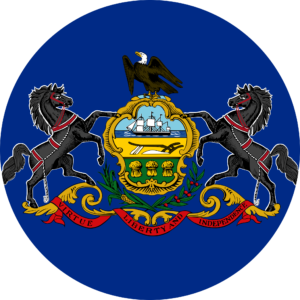Pennsylvania sales tax guide
Welcome to the Pennsylvania sales and use tax guide, prepared by 1stopVAT’s team. Here you will find the essential information on what is the sales tax rate in Pennsylvania and the process of becoming a registered collector of the Pennsylvania sales tax (PA). If you have VAT-related questions not covered in the guide, please reach out to the 1stopVAT team for guidance.
Pennsylvania sales tax explained
A sales tax is one of the contributions a company in Pennsylvania or other states in the US has to pay to the administrative authorities. This tax is considered a consumption tax, falling on the final customer of a good or service. The Pennsylvania Department of Revenue (PaDOR) administers the sales tax Pennsylvania and supervises the compliance taxpayers. The seller of a good or service in Pennsylvania or remotely to customers in Pennsylvania acts as a de facto collector of the sales tax for Pennsylvania.
Not all businesses must collect the sales tax. Similar to other states, a nexus has to be established in order for a company to register as a sales taxpayer. The state has a fixed Pennsylvania sales tax rate and local municipality taxes. Therefore, companies have to know the exact location of the sale to find out what sales tax they should collect. Some items are exempt from the sales tax in Pennsylvania (PA); please find about them below. The clients of tax-exempt companies selling taxable goods or services are bound to account for the use tax. Both sales and use tax Pennsylvania have to submit to the tax authority at the end of an assigned taxation period.
Finding out if you should register for Pennsylvania state sales tax
Several legal criteria must be fulfilled in order to become a registered sales taxpayer.
- Your company must have a strong economic tie with Pennsylvania (learn more below)
- Your company must sell services or goods to Pennsylvania residents, and these goods or services are taxable
- Your clients are required to pay sales tax by the state of Pennsylvania
Forming a nexus in Pennsylvania
Only after you form a nexus can you begin charging the correct Pennsylvania sales tax rates from your clients. Here are the ways you can establish a sales tax nexus:
- Physical nexus. Your company becomes automatically eligible for collecting Pennsylvania state sales tax rate if it has a physical presence in the state.
For remote sellers:
- Economic nexus. Gross sales of over USD 100 000 in the last 12 months are considered a substantial economic presence in the state and put a sales tax burden on the seller. This provision was confirmed in 2019, overthrowing the previous system, which allowed sellers to elect to either collect the Pennsylvania tax sales or send notices to their customers.
- Affiliate or click-through nexus. Using the support of physical persons in Pennsylvania or aiding sales by advertising to Pennsylvania residents via an affiliate link establishes a sales tax nexus in the state.
- Trade shows. Taxable sales in trade shows in Pennsylvania might be enough to trigger a sales tax nexus in the state.
- Inventory in the state. If your company stores inventory in Pennsylvania (including Amazon warehouses), you might need to account for the sales tax.
Finding out if your company sells taxable items
Prior to learning how much is the sales tax in Pennsylvania that you should charge and collect, we recommend double-checking your goods or services are taxable.
Tangible personal property is taxable in Pennsylvania, and the general sales tax rate Pennsylvania is applicable unless an item is specifically tax-exempt. Among the tax-exempt items are coal, groceries, prescription medicines, and some farming items.
Like in other states, services are non-taxable, but there are plenty of exemptions and cases when the sales tax rate in Pennsylvania has to be added to the final service price. Among such services are lobbying, employment and secretarial services, and lawn care. A complete list of these services is published on the PaDOR website.
Registering for Pennsylvania sales tax online
Online registration is the fastest and most convenient way to become a sales tax-paying company. To access the free-of-charge registration, you should visit the Pennsylvania Department of Revenue’s website. You will have to provide your business and personal details, and your certificate will be ready in no time. If you have trouble registering, please contact 1stopVAT’s team for assistance.
What is the current sales tax in Pennsylvania?
As mentioned previously, to determine how much sales tax in Pennsylvania you should collect, you must take into account the general and local sales tax rates. The base Pennsylvania sales tax percentage is 6 %. It is combined with municipality rates that range from 0 to 2 %. The highest total sales tax rates Pennsylvania go up to 8 %. If you have trouble calculating what’s the sales tax in Pennsylvania you should collect from clients in different municipalities, please try using our Sales Tax Calculator and if you have more questions, contact our team.
Filing the sales tax
Upon registration, companies are assigned several frequencies to file taxes by Pennsylvania DOR. These can be monthly, quarterly, or annual. Sticking to the deadlines is essential as missing the submission might end up in penalties and an increase in interest.
Need assistance with Pennsylvania sales tax?
We can help!
Dedicated account manager
As our client, you will be assigned to a multilingual account manager who can address all your tax-related inquiries and resolve any issues you may have at any time.
Single point of contact
We serve as single point of contact, simplifying the process and ensuring that your VAT compliance is handled efficiently and effectively within single stop.
Exclusive customer service
We support our clients, ensure fast response time and always go beyond by offering tailored assistance and individual attention.
Certified experts
Our team is combined of more than 40 experts, who can provide wide range of services and are certified members of IVA, AITC and VAT Forum. Currently we have more than 800 clients and knowledge how VAT works in 100 locations.



